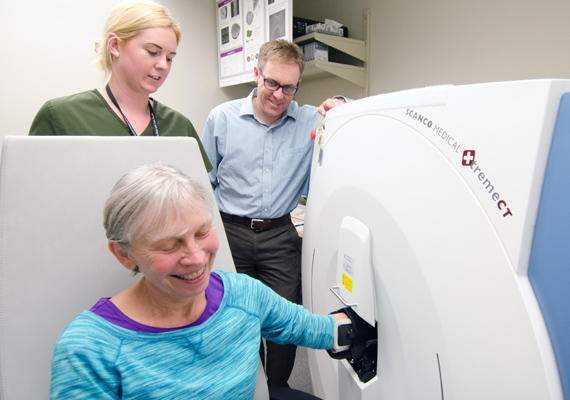
Research & Accolades
The Department of Radiology’s precision medicine research focus aligns with that of the Cumming School of Medicine and University of Calgary. The Department aims to create, evaluate, and deploy the next generation of medical imaging techniques that can identify specific patient and disease characteristics that allow personalized treatments targeted at specific structural, functional, and molecular characteristics of each patient to optimize clinical outcome. Central to achieving this vision is collaborative cross-disciplinary research.
The Image Science Division is the basic research arm of the Department of Radiology that brings together imaging scientists across the spectrum from neuro to musculoskeletal, to cardiovascular, to paediatrics. Under the leadership of Division Head Dr. Bruce Pike, the Image Science Division has seen tremendous growth in the past five years, growing from four to 14 full-time members. The young, energetic and diverse membership are leading the research-informed innovations within the department and training the young scientists in the development and application of medical imaging methods.
Research within the Department of Radiology includes, but is not limited to, the following areas:
- Paediatrics: the Child and Adolescent Imaging Research (CAIR) Program within the Department manages a research-dedicated 3T MRI based at the Alberta Children's Hospital. Our group uses multiple imaging methods to understand healthy brain development and developmental disorders, recovery from brain injury, cognitive and behavioral function and dysfunction, treatments, and interventions.
- Musculoskeletal: imaging and modeling of bone and joints in our Centre for Mobility and Joint Health focuses on using novel technologies and analysis methods for better diagnosis and monitoring of diseases such as inflammatory arthritis, osteoporosis and osteoarthritis.
- Structural and Functional Brain Imaging: for example, in epilepsy, multiple sclerosis, Parkinson’s disease, Alzheimer’s disease, and mental illnesses
- Stroke and Vascular Disease: imaging applications to the understanding, early diagnosis, and intervention of vascular diseases, including stroke and vascular dementia.
- Cardiac Imaging: research focused on the performance, development and training of cardiovascular MRI techniques, working to improve patient outcomes through discovery and innovation in the field of cardiovascular image-guided therapy.
- Pre-Clinical Animal Modeling: developing and applying imaging technology to study disease models and translate technology to patient care.
- Computational Neuroscience: development and identification of computational models of brain activity to clarify how the signals recorded in neuroimaging and electrophysiology are generated and how they can be used understand neurological diseases.
- Machine Learning and Artificial Intelligence: development and application of new image processing methods, algorithms, and software tools for the analysis of medical images; including image-based extraction of clinically relevant parameters and biomarkers describing the morphology and function of organs.
- Focused Ultrasound: development of instruments and methods for the delivery of focused ultrasound into the brain with applications in neurosurgery, drug delivery and neurostimulation.
- MR Spectroscopy: quantification of metabolites using traditional single voxel approaches as well as advanced and accelerated editing methods to target additional metabolites, with application studies in brain injury, pain, mental health and developmental disorders.
- Epilepsy Imaging: development of high spatiotemporal resolution acquisition methods and analysis tools for the detection of epileptic lesions and the monitoring of epileptic discharges to improve the diagnosis and presurgical evaluation of focal epilepsy patients.

Centre for Mobility and Joint Health
The Centre for Mobility and Joint Health at the University of Calgary is an interdisciplinary team of engineers, biomechanists, computer scientists, kinesiologists, clinical scientists and an array of other experts. The focus of our research group is to investigate adaptation of tissues such as bone and cartilage in joint injuries and diseases.

Experimental Imaging Centre
The Experimental Imaging Centre (EIC) in the Cumming School of Medicine serves as a critical resource in multidisciplinary research programs using high-field magnetic resonance imaging (MRI). A 9.4T MRI with focused ultrasound is applied to studies of novel therapies and research in a range of disorders such as MS, stroke, cancer, arthritis, inflammation and concussion.




